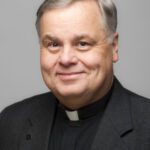One of the most remarkable people I met while teaching theology in East Africa in the late 1980s was Bishop Serapio Bwemi Magambo, of the Diocese of Fort Portal Uganda. Fort Portal is a market town near the Rwenzori Mountains – sometimes called the Mountains of the Moon. It is the home, in East Africa, of my religious order, the Congregation of Holy Cross. The first members of the community to serve there were three newly ordained Holy Cross priests who arrived in 1958 to assist the White Fathers who had established the mission long before. A Holy Cross priest, Vincent McCauley, was consecrated the first bishop of the newly established diocese in 1961. Bishop Magambo, McCauley’s successor, was the first African bishop of the diocese. He held the memory of his predecessor in great reverence, preserving the founding bishop’s old office just as he had left it, as a kind of shrine. In this Bishop Magambo proved prescient, as Bishop McCauley’s cause for sainthood has since been introduced. Bishop Magambo was a burly, robust, charismatic man with a deep, booming, resonant voice. He had an ample waistline at a time when great girth was indicative of high status. He had a warm, avuncular personality and exuded sublime confidence in the dignity of his office.
Bishop Magambo invited all of us members of Holy Cross to Fort Portal to celebrate the fortieth anniversary of our community’s arrival in the diocese. The Feast of the Epiphany was chosen for the celebration. The cathedral was filled to capacity for the Mass. In his sermon, Bishop Magambo told the hushed throng that, for Fort Portal, the arrival of the White Fathers had been the first epiphany. The arrival of the Congregation of Holy Cross was the second epiphany. Then, after a significant pause, his great voice boomed out with tremendous gravity, “I am the third epiphany.”
After Mass, Bishop Magambo invited his Holy Cross guests back to his compound for a reception. He assured us that knowing our community as he did, he knew precisely how we should best be entertained. By this time night had fallen. After a reverent visit to Bishop McCauley’s office, he led us back outdoors, where he personally supervised the distribution to each of us of a warm bottle of Pepsi Cola from a case he had specially obtained for the occasion. Then it was time for the crowning gesture of his hospitality. He had a record player brought out, and placed on the turntable an old, rather scratched recording of the Notre Dame Glee Club. For the rest of the evening that record was played over and over again, and the strains of the Victory March wafted over the foothills of the Mountains of the Moon.
A few years later, when I was a graduate student in England, I lived in a diocesan parish with a newly ordained priest on its staff. The young fellow was devout and kind, but not at all worldly. On the Feast of the Epiphany, he was asked to say Mass for the youngest students at the parish primary school. In his homily, he said to them, “Now some of you littlest students may be a bit worried about this big word, ‘Epiphany.’ Well don’t be. It simply means, ‘manifestation.’” The youngsters took this remark in their stride, but some of the teachers had to rush to the exits in order to maintain decorum in the chapel.
Of course, the young priest was precisely correct. Epiphany does mean “manifestation” – the manifestation of Jesus Christ in the world in a striking new way. So, Bishop Magambo was right as well. Surely, the onset of the first African bishop in an African diocese could be understood as a striking new manifestation of our Lord there. As is evident from our readings, with their references to magi, camels, gold, frankincense, and myrrh, Roman Catholics associate the Epiphany with the arrival of the Wise Men at the manger, an event that is regarded as the first manifestation of Jesus to the Gentiles – a category of persons that includes most of us. So, the Feast of the Epiphany is a good time for all of us to reflect with gratitude on the ways, doubtless more than three, that the Son of God is manifested in our own lives, beginning with the Eucharist we will share today.
Rev. Charles B. Gordon, C.S.C., is co-director of the Garaventa Center for Catholic Intellectual Life and American Culture at the University of Portland. He writes and records a regular blog called “Fractio Verbi.”





